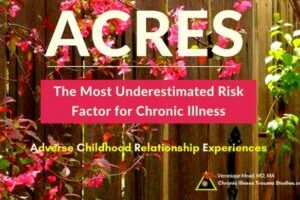From Chronic Illness Trauma Studies blog: “If you’ve heard of adverse childhood experiences (ACEs) and have a low score (such as 1 or ‘zero ACEs’), you may still suspect that trauma has somehow affected your health but feel like your doctors and the research are missing something important.
Or you may have a high ACE score and feel that it was the emotional abuse or neglect that was the hardest.
In other words, you recognize that your childhood was difficult – you got yelled at a lot, or had to be a pleaser to keep things running smoothly in your family, or you learned that being quiet and invisible was the best way to get by, or you lost a parent and lived with a family that never really recovered from this or some other trauma.
This post introduces the huge and unrecognized impact of one of the ACEs known as emotional neglect. I refer to these as adverse childhood relationship experiences (ACREs). This post will help you assess links between ACREs and chronic illness. It also shares the science.
Life may feel like a slog. Your body may be incredibly sensitive to treatment (even tiny doses make you worse or don’t work or stop working after a while). You may have PTSD, complex PTSD or a chronic illness (or all three) and feel that it relates to trauma but have nothing that validates your hunch.
Adverse childhood relationship experiences (ACREs) draw from the science that recognizes how these kinds of difficult relationships influence the nervous system, epigenetics and health.
ACREs refers to emotional neglect and abuse in childhood. Experiences such as not feeling seen, having had no one to turn to with difficult feelings when you were a child, having had little sense of connection with others in your family, having not felt safe or protected or loved even though there was no abuse or violence (or if there was violence or abuse), having been treated as though you were invisible or the problem or weak or stupid. And more.
Adverse childhood relationship experiences increase risk for chronic illness, PTSD and complex PTSD. ACREs represent what are also known as attachment wounds, developmental trauma, complex trauma and otherwise difficult early events that children experience when their parents are unable to be nurturing, supportive, kind and gentle, and to repair the inevitable mistakes that happen.
I have created the term ‘ACREs’ as a construct that links to the well-studied science of adverse childhood experiences (ACEs). ACEs have shown us that 10 kinds of trauma influence risk for chronic health conditions in children and adults – losing a parent such as from divorce, separation or death; physical, emotional and sexual abuse; physical or emotional neglect; having a parent with a mental illness or who abuses substances; witnessing violence in your home; having had a household member who’s gone to jail (which, like other ACEs, is usually related to yet other ACEs in the family). ACEs are the tip of the trauma iceberg and show us that other kinds of trauma influence longterm health too.
Research has demonstrated that ACREs – the RELATIONSHIP factor – can also have important and similar effects as well.
The value of understanding ACEs and ACREs? When we recognize that early adversity is indeed a risk factor for our symptoms, it gives us the context to find new tools for healing. Because reversing symptoms, recovering, improving and even reversing the effects of trauma is possible. It may not be a quick fix, but the effects of trauma are more common than we’ve thought – and not as solid or permanent.
In addition, there are positive experiences that make us more resilient in childhood as well as in adulthood. I’ll share some of that encouraging research below, including the single question that one family physician discovered that helps identify risk vs. resilience.
Even more good news? Being sick, having a chronic illness. living with mysterious or difficult-to-diagnose symptoms, having PTSD or complex PTSD – is not in your head. It is not your fault. It’s in our nervous systems and immune systems, in our cell danger responses and more.
What we’re learning is that ACREs are ‘invisible ACEs.’
And there is a link between ACREs and chronic illness and other chronic symptoms.
ACREs are among the hardest types of adversity to recognize. This is because the families we grow up in feel normal to us. It’s all we’ve known. They feel like they were normal even when they have been especially difficult. Because children tend to think it’s their fault when things aren’t going right in their environments or in their families. Or when their parents are stressed or anxious or upset.
Since starting to look into the research 20 years ago as well as working to heal from my own chronic illness during this time period, I’ve come to believe that ACREs are among the single most underestimated source of risk for chronic illness and other chronic health conditions.”

***
Back to Around the Web











